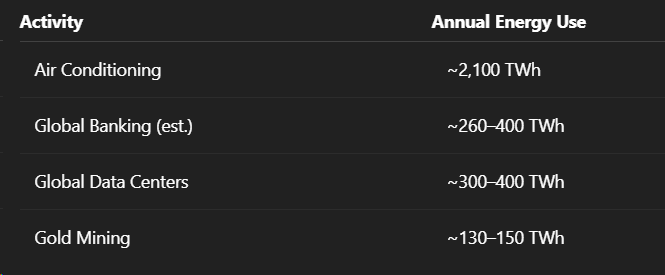Powering Freedom
The Ethical Case for Bitcoin's Energy Consumption
Critics often target Bitcoin mining by highlighting its energy consumption, implicitly labeling this energy as wasteful. However, this critique fundamentally misunderstands the issue. Here is a structured, rigorous dismantling of such criticisms:
Energy Use Is Not Waste
Energy usage alone does not equal energy waste. Every economic activity—manufacturing, computing, transportation, banking—requires energy. The essential question is whether the energy consumed generates commensurate value and whether this value could be obtained more efficiently elsewhere.
Bitcoin mining is no more inherently wasteful than other systems like banking, data centers, or the internet itself. The meaningful comparison lies in the relative value Bitcoin provides compared to these systems.
Fiat Systems Are Energy-Intensive
Critics frequently neglect the considerable energy consumed by the current fiat money infrastructure:
Central banks and regulatory agencies
Traditional banking infrastructure (branches, ATMs, data centers)
Payment systems (SWIFT, ACH, VISA, etc.)
Security and physical infrastructure
If Bitcoin replaces or significantly supplements these legacy systems, the overall energy consumption could potentially decrease dramatically.
Driving Renewable Energy Adoption
Bitcoin mining uniquely incentivizes renewable energy investment due to its geographical flexibility, with miners seeking the cheapest energy sources available, predominantly renewable ones:
More than 52% of Bitcoin mining energy currently comes from renewable sources (Cambridge, 2025).
Mining creates a financial incentive for the development and stabilization of renewable energy sources, including hydro, wind, solar, and geothermal.
Bitcoin miners monetize stranded or otherwise wasted energy, such as excess renewable energy capacity and flared natural gas.
Thus, Bitcoin actively accelerates renewable energy development and adoption.
Protecting Human Welfare
Bitcoin's societal value extends far beyond its role as a currency:
It provides financial sovereignty, protecting individuals against inflationary policies, arbitrary confiscation, and financial censorship.
Its decentralized nature protects populations living under authoritarian regimes from state-level financial control.
Bitcoin enhances financial inclusion, granting access to global markets for the billions currently underserved by traditional financial systems.
Thus, Bitcoin mining secures a fundamental human right: economic freedom.
Energy Consumption in Perspective
Bitcoin’s annual energy consumption (~170 TWh/year) is modest compared to other accepted activities:
Bitcoin is singled out disproportionately despite being comparable or even smaller in energy consumption than activities widely recognized as valuable.
Ethical Imperative
The energy used in Bitcoin mining supports not just financial, but ethical values:
Decentralized monetary sovereignty
Resistance to monetary manipulation and censorship
Protection against authoritarian financial repression
Viewed ethically, Bitcoin mining's energy use is not only justified but morally commendable.
Conclusion
Criticism focusing solely on Bitcoin's energy consumption is fundamentally flawed, neglecting the broader context and value provided by the network. Bitcoin mining represents a justified, ethically defensible investment in a freer, more equitable global monetary system.



